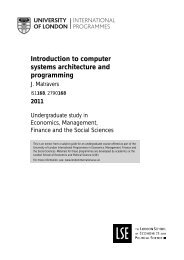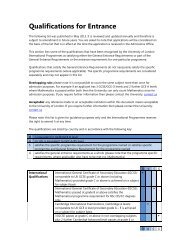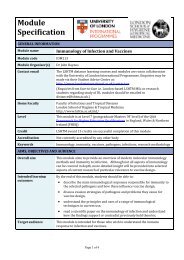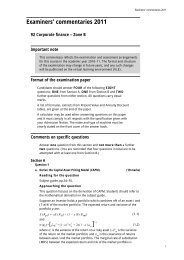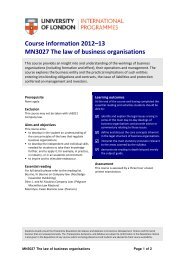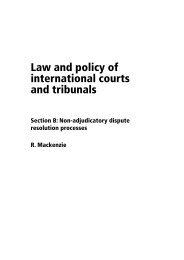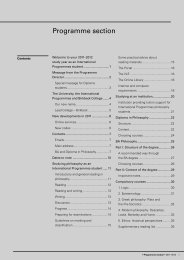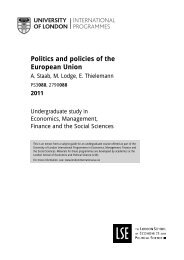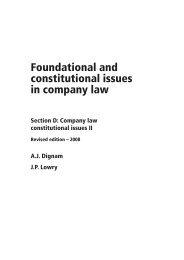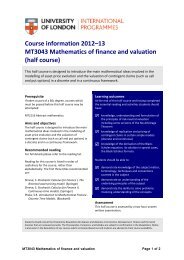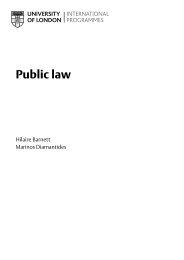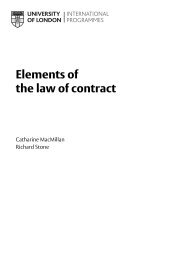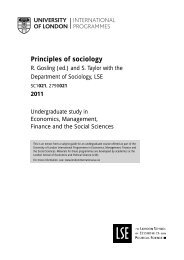2013–2014 Clinical Trials Epidemiology Global Health Policy ...
2013–2014 Clinical Trials Epidemiology Global Health Policy ...
2013–2014 Clinical Trials Epidemiology Global Health Policy ...
Create successful ePaper yourself
Turn your PDF publications into a flip-book with our unique Google optimized e-Paper software.
<strong>Clinical</strong> <strong>Trials</strong><br />
A welcome from Course Directors Diana Elbourne, Julia Langham and Claire Snowdon<br />
Diana Elbourne Julia Langham Claire Snowdon<br />
These courses will be relevant both for those<br />
wishing to gain an overall understanding of clinical<br />
trials before moving into the eld, and for those<br />
who have general or specialist experience in this<br />
area and aim to broaden their role in the design,<br />
management, analysis and reporting of clinical trials.<br />
These courses aim to provide students with a<br />
theoretical and practical understanding of the<br />
issues involved in the design, conduct, analysis<br />
and interpretation of randomised controlled trials<br />
of health interventions. They will be suitable for<br />
students working in high, middle and low income<br />
countries. Students will be trained to develop skills<br />
to scrutinise information, to critically analyse, to carry<br />
out research, and to communicate e ectively.<br />
The need for rigorous evaluation<br />
of components of health care is<br />
increasingly recognised worldwide.<br />
An important type of evaluation<br />
is the randomised controlled<br />
clinical trial. These courses will<br />
give students an understanding<br />
of trials before moving into this<br />
increasingly important eld.<br />
For whom are the courses relevant? Entrance requirements<br />
Course objectives<br />
10 Postgraduate study in health<br />
All applicants are<br />
required to have:<br />
EITHER (a) A rst or second<br />
class honours degree, or the<br />
equivalent, from a university or<br />
other institution acceptable to<br />
the University of London, in a<br />
subject appropriate to the course<br />
OR (b) An appropriate professional<br />
or technical quali cation, together<br />
with at least three years’ relevant<br />
experience, which satis es the<br />
University as a quali cation<br />
equivalent to a second class<br />
honours degree. All applications<br />
in this category will be considered<br />
on an individual basis.<br />
Students who do not satisfy the<br />
above requirements may still<br />
be admitted at the discretion of<br />
the School on the basis of their<br />
academic quali cations, work<br />
experience and references.<br />
All applicants must have an<br />
advanced level of ability to work in<br />
English. Applicants may be required<br />
to pass or to have passed within the<br />
last three years, at the appropriate<br />
level, a test of pro ciency in English<br />
acceptable to the University:<br />
MSc students may choose from<br />
a number of elective modules<br />
which will allow them to expand<br />
and deepen their conceptual and<br />
practical skills. The main disciplinary<br />
perspectives will come from clinical<br />
trials, statistics and epidemiology,<br />
but others will be considered in<br />
both the core and elective modules.<br />
The Princeton Test of English as<br />
a Foreign Language (TOEFL)<br />
– Paper-based Test: a minimum<br />
overall score of at 600 and<br />
a minimum of 5.0 in the<br />
test of written English.<br />
– Computer-based Test: a<br />
minimum overall score of at<br />
least 250 and a minimum of 5.0<br />
in the test of written English.<br />
– Internet-based Test: a minimum<br />
overall score of at least 100<br />
and a minimum of 5.0 in the<br />
test of written English.<br />
The British Council Test (IELTS)<br />
A minimum overall score of<br />
7.0 and a minimum of 7.0 in<br />
the written component.<br />
The <strong>Clinical</strong> <strong>Trials</strong> courses are online<br />
courses, which are supported by<br />
asynchronous web-based discussion<br />
forums. It is essential that all students<br />
have regular access to the internet to<br />
access the course materials, participate<br />
in web-based discussions, access online<br />
library resources and submit assignments.<br />
Students must have a computer (see page<br />
9 for specifi cations) and are responsible for<br />
ensuring adequate system maintenance.<br />
Students will also require a calculator.<br />
Comic relief for stressed emergency teams<br />
Ian Roberts, Professor of Public <strong>Health</strong> at the School and a team of<br />
researchers devised a storyline to highlight the latest research into the<br />
life-saving bene ts of tranexamic acid to appeal to doctors, nurses and<br />
paramedics on the front-line of medicine. http://bit.ly/lshtmdl



